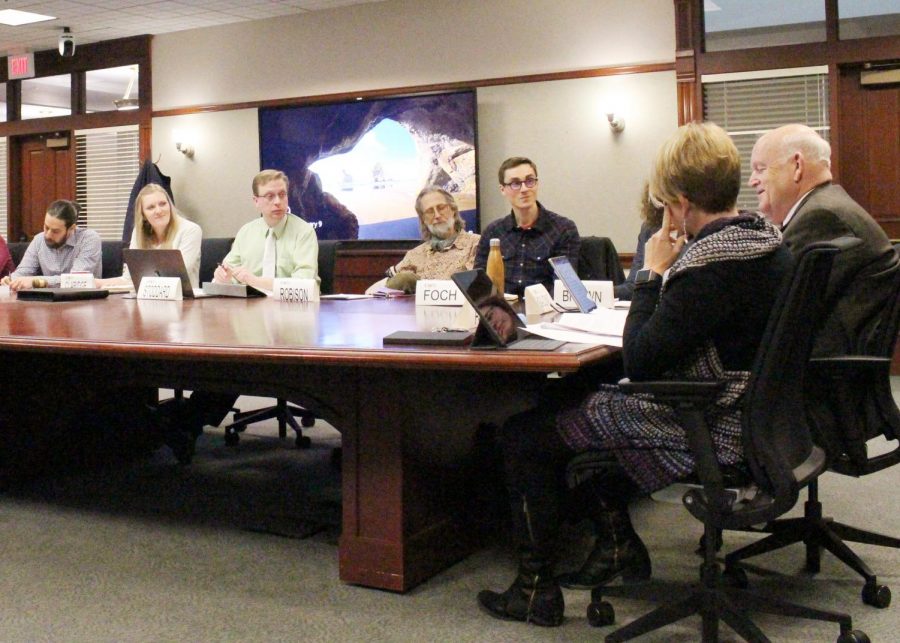Faculty senate meeting overview
Dr. Amy Claridge of the Family and Consumer Sciences Department motivates the meeting as 2018-2019 Faculty Senate Chair.
January 16, 2019
Last week was the first monthly faculty senate meeting of the quarter. Here are the most important topics discussed during the meeting. These topics have the potential to be talked about all quarter and into the forseeable future.
Student advising being reorganized
According to the CWU faculty senate, student advising is a top priority. Concerns about advising came up last quarter when the accreditation report came out. The current advising model is set up for students to have a different advisor for every program they’re involved in. According to Faculty Senate Chair Amy Claridge, some students have five or six advisors.
The restructuring of advising will start by having town hall meetings that will take place this quarter. Different advising models will be presented during the process. There will be an ongoing advising committee made up of faculty and academic advisors tasked with simplifying the process for students.
“That’s the goal, to make it simple,” Claridge said.
Students will begin to see changes in the spring. The plan at this time, is to have advising running under a new model by next fall.
Official free speech policy to be discussed
Last year, Gonzaga University denied conservative Ben Shapiro the opportunity to speak at the university.
Gonzaga’s decision made CWU evaluate their free speech policy.
“CWU currently does not have a policy on free speech. This new policy details the rules around engaging in free speech and other expressive activities on campus. After the internal review is complete, the policy will be out for public review for at least 30 days,” Claridge said.
An expressive activities policy (free speech) will be presented to the president’s advisory committee, in February. After it’s presented there will be 30 days for public feedback.
Students retention rate dropping
CWU lost around 100 students from last quarter going into this winter. According to Claridge, there are a number of factors that go into the retention drop. Students drop out because of financial, family and/or health issues. Students may transfer to another university because a degree isn’t offered at CWU. CWU developed a retention task force last year to work on increasing the retention rates of the university. The task force will continue working together this year.
According to Claridge all departments are in the process of evaluating unnessaccary barriers that get in the way of students’ abilities to continue their education. Student account holds, financial aid, IRS verification are some of the barriers under evaluation by the task force.
According to CWU President Gaudino, the university keeps track of student retention rates; not only for revenue purposes, but also to ensure students are getting a four year degree even if that means the student transfers to another university to do so. The main concern is if a student leaves school and doesn’t return or transfer to another university. At that point, the likelihood of a student returning to a four year college to obtain a degree drops considerably according to president Gaudino
The Operating and Capital Budget Priorities for 2019-2021 revealed
The Health Sciences academic facility has the highest allotment, a total of $35 million was requested to finish construction on the facility. CWU also hopes to improve its aviation program, potentially giving it $5.3 million in a lump sum payment to purchase 10 new planes and four flight simulators. CWU is the only institution in the Pacific Northwest to offer a bachelors program in aviation according to the Operating Budget Report. CWU also hopes to expand its aviation programs, for which Aviation would receive $9.9 million In total, aviation would be looking at a total investment of $15.2 million from the university.
In 2009, Aviation had 150 student majors; in 2018 the program had 250 majors. According to the Capital Budget the $9.9 million degree expansion is needed.
“The project supports intense industry and student demand for aviation degrees. CWU requests funds to expand training facilities that are needed to grow the capacity of this academic program, which is expected to more than triple enrollment in the upcoming biennial,” states the State Capital Budget Priorities report.
Update on general education
General education curriculum changes are almost complete, and starting spring quarter students currently enrolled in general education programs can switch over to the new program. Incoming freshmen and sophomores attending general education courses will be under the new guidelines starting fall quarter. The next faculty senate meeting will be on Feb. 6 at 4 p.m. in Barge 412.

